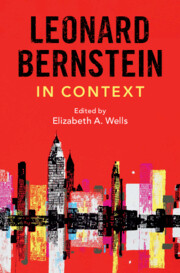Book contents
- Leonard Bernstein in Context
- Composers in Context
- Leonard Bernstein in Context
- Copyright page
- Contents
- Illustrations
- Musical Examples
- Contributors
- Preface
- Part I Bernstein’s World
- Part II Conducting
- Part III Composition, Creation, and Reception
- Part IV Bernstein as Musical and Cultural Ambassador
- Chapter 20 Music Appreciation
- Chapter 21 Omnibus
- Chapter 22 The Young People’s Concerts
- Chapter 23 Israel
- Chapter 24 The USSR
- Chapter 25 Asia
- Chapter 26 Latin America
- Part V Connections
- Part VI The Legacy
- Further Reading
- Index
Chapter 21 - Omnibus
from Part IV - Bernstein as Musical and Cultural Ambassador
Published online by Cambridge University Press: 06 April 2024
- Leonard Bernstein in Context
- Composers in Context
- Leonard Bernstein in Context
- Copyright page
- Contents
- Illustrations
- Musical Examples
- Contributors
- Preface
- Part I Bernstein’s World
- Part II Conducting
- Part III Composition, Creation, and Reception
- Part IV Bernstein as Musical and Cultural Ambassador
- Chapter 20 Music Appreciation
- Chapter 21 Omnibus
- Chapter 22 The Young People’s Concerts
- Chapter 23 Israel
- Chapter 24 The USSR
- Chapter 25 Asia
- Chapter 26 Latin America
- Part V Connections
- Part VI The Legacy
- Further Reading
- Index
Summary
Between October 1955 and March 1958, Bernstein presented seven television broadcasts on the Omnibus culture series. He addressed topics from Beethoven, Bach, modern music, and opera to musical theatre and jazz and appealed widely to audiences, educating and offering knowledge while avoiding excessively elevated language. Writing the scripts himself, Bernstein effortlessly moved from various roles as a conductor, narrator, pianist, and educator within the context of the show, dazzling audiences with his charismatic personality and stylish attire. The programmes were well received, with an estimated sixteen million viewers tuning in to watch the December 1955 ‘The Art of Conducting’ broadcast. His carefully selected words, analogies, and references were extremely relatable to the middle-class family demographics of the programmes, and the broadcasts fostered Bernstein’s growing pop-star status as he gained international popularity as a conductor and both a Broadway and classical composer.
- Type
- Chapter
- Information
- Leonard Bernstein in Context , pp. 175 - 182Publisher: Cambridge University PressPrint publication year: 2024

